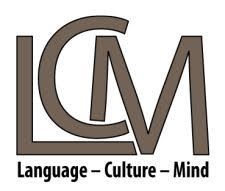Keynote Speakers

Felix Ameka
Felix K. Ameka is Emeritus Professor, Ethnolinguistic Vitality and Diversity in the World,
Leiden University, He is a socio-cultural-cognitive linguist who conducts interdisciplinary
research on the reflexive relations between language, culture and cognition and linguistic
worldviews. He focuses on the meaning (semantics and pragmatics) of linguistic signs (including
words, collocations, grammatical constructions, and emblems) in individual lingua-cultures and
across languages, and the diffusion of meaning patterns across lingua-cultural boundaries. His
interests are in language documentation and description, anthropological and contact linguistics,
multilingualism, sociolinguistics of development, and comparative and socio-cultural language
studies. he has become interested in digital humanities, and specifically in language
technologies for lesser-resourced languages. He has published on the lexicon, grammar, (ethno-)semantics, (ethno-)pragmatics, and language contact of West African languages. Recent publications have appeared in Journal of Pragmatics, Language Documentation & Conservation, a volume on Swearing and Cursing, and a chapter (with Azeb Amha) in Approaches to language and culture (de Gruyter 2022). He is co-Editor (with D. Hill) of Languages, Linguistics and Development Practices (Palgrave 2022) and Editor-in-Chief of the Journal of African Languages and Linguistics. He is a Fellow of the Ghana Academy of Arts and Sciences, Australian Academy of Humanities, and Academia Europaea.
Talk: Feeling, thinking and lingua-cultural diversity: on ethno-theories of "emotions"

Gerd Carling
Gerd Carling is Professor of Empirical Linguistics at Goethe University, Frankfurt am Main in Germany. Her research interests target historical linguistics and language evolution, in particular on Indo-European and South American languages. She has initiated a research program on language diversity and evolution and founded the database infrastructure DiACL – Diachronic Atlas of Comparative Linguistics, which harbors data from a large amount of languages worldwide. In addition, she is an expert on the ancient Indo-European language Tocharian of Eastern Central Asia, as well as Scandinavian varieties of Romani chib. Recent publications include the volumes Linguistic Archaeology. An Introduction and Methodological Guide (Routledge, 2024), A Dictionary and Thesaurus of Tocharian A (Brill/Harrassowitz 2023), and Mouton Atlas of Languages and Cultures (De Gruyter, 2019), as well as articles in journals such as Linguistic Typology, PLOS ONE, Language, Philosophical Transactions of the Royal Society B, Diachronica, and Frontiers of Communication.

Martin Lang
Martin Lang is Assistant Professor at LEVYNA: Laboratory for the Experimental Research of Religion at Masaryk University, Brno, Czech Republic. His work focuses on the question of whether and how religious beliefs and behaviours facilitate cooperation with a specific focus on cooperative communication facilitated by ritual performance. Dr. Lang also conducts cross-cultural research (with a particular focus on field site in Mauritius) on the evolution of belief in moralizing gods, the role of ritual in managing anxiety, and the role of costly signals in stabilizing within-group cooperation and aggressive action against out-groups.
Talk: The evolution of human collective ritual as a platform for communicating cooperative intentions

Iris Nomikou
Iris Nomikou is co-Director of the Research Centre for Interaction, Development and Diversity and Senior Lecturer in the Department of Psychology at the University of Portsmouth, UK. Her work crosses disciplinary boundaries and draws from interactional linguistics cognitive science and developmental psychology. She studies everyday interactions using a combination of qualitative and quantitative methods to holistically capture the ways in which early interactional experiences provide the ecology within which children participate in meaning making and discover and learn language, She has worked extensively on the interplay between talk and bodily experience for the development of meaning. Taking a continuity approach to the development of language she is interested in the creative solutions and different developmental paths that children use in learning to get things done with language, and has therefore also worked with children from different cultural communities as well as neurodivergent children.
Talk: Tuning into language: infants’ trajectories of participation in everyday interaction
